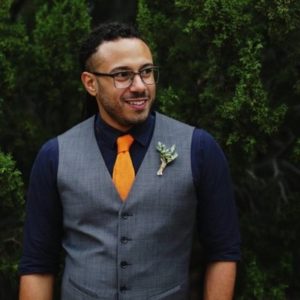Qwestion & Answer with Sean Campbell, Senior Reporting Fellow at ProPublica
Qwoted is committed to exploring the current state of the media by speaking to industry leaders and educating future generations of media professionals. What has social media and technological innovation brought to the table? What can we expect for the future of journalism?

Reporter Sean Campbell is an investigative journalist and Senior Reporting Fellow at ProPublica. Campbell worked covering gun violence in America at The Trace, where his team won a Sidney Award from the Hillman Foundation and the 2020 Les Payne Award for Coverage on Communities of Color from the Deadline Club. Campbell currently covers the pandemic, national health trends, and long-term care. He has a Bachelor of Science in Aerospace Engineering from the University of Central Florida, an MFA in Creative Writing from Sarah Lawrence College, and a MS in Data Journalism from Columbia University, where he is also a Data Journalism professor. His investigative reporting thesis unveiled a worker harm scheme and was covered by several New York publications including ProPublica. Campbell’s work has garnered responses from senators, change in the CDC, and influenced Twitter’s updates to its policy on 3D-printed guns. “Writing on difficult issues has its challenges, but I’ve learned to empathize while still getting as close to the facts as possible. Not doing so is a great disservice – not just to the job, but to someone’s story,” says Campbell.
Which aspects of your work do you find the most challenging? The most rewarding?
SC: Seeing your story have an effect out in the world and to know it made an impact is an element of this that is immensely rewarding. When I do my reporting, that’s something I always strive for, regardless of how time consuming and stressful it may be.
One challenge about the nature of reporting is the amount of time and effort it takes to do good work. Investigative reporters talk to anywhere from dozens to hundreds of people per story, which is necessary to get a full perspective of an issue. It can be difficult to spend so much time trying to get at the truth, and after all of it, still have your credibility doubted.
What are you hearing from your students or members about their ambitions and hopes for the profession?
SC: A common concern is low pay. There are fewer journalism jobs now than there were 30 years ago, and students who choose to go into this work are also concerned about finding a job. Work is frequently short- term, requiring new reporters to make sacrifices in other areas to consistently prove themselves. Veteran journalists that retired years and decades ago tell me they might not make the choice to enter today’s journalism industry.
What do you see as some of journalism’s biggest potential pitfalls?
SC: I know there is a distrust for the media, as I encounter it every day. In the past, attacks on the media were nowhere near as popular. People trusted news sources all along the political spectrum. Too often today, I see the story that’s told first is the one that’s the most circulated. Journalism by and large is liberal leaning, so we’re missing a huge chunk of people who don’t have these same views and sources that are quoted do not tell both sides of the story. Although this is needed for a more powerful, nuanced story that gets at the truth, we continue to see false claims evolve and play out, including more critical areas of health. We’re at this point in society where it’s common for people to doubt facts because it’s so easy to locate another bit of news that presents itself as factual, while it just supports the reader’s preconceived notions.
What do you think about the role of technology in journalism? Is it helpful? harmful? Something in between?
SC: Technology is a double-edged sword. It’s definitely made doing the work easier – finding sources, sharing your work, etc. Oftentimes articles now have an audio or video component in addition to the written information. There used to be a barrier to entry (time, money) to get a news story that people would see and deem worth reading, that no longer exists. This has led to the dissemination of fictional stories packaged in a news format that are targeted and propagate just as easily as the truth. They are written in such a way to spread amongst online communities that already hold those beliefs and are not aiming for facts, but for penetration into the internet space. As a result, some people don’t understand the difference between a legitimate news source and someone making a YouTube video from their couch. You can trust the reporting that comes out of the out of ProPublica, the Times, the WSJ, because so much time and effort goes into creating those stories and running down different details and reports.
What learnings have made a tremendous difference in your career? What advice would you give to aspiring young writers and reporters?
SC: Regardless of the industry you work in, understand that success will mean extra time and effort. Once you’ve lost authority and trust, it’s so difficult to gain it back. Make the extra calls, thoroughly read the extra documents, and put in the time to cover all the sides of a story – not just ones from the people that will easily speak with you. Look for the things that drive you, what you are interested in and want to learn more about. Curiosity is needed to engage in this kind of work, and wanting to understand, learn more, and get to the truth is meant to be your driving force. Each story you write will make you better at covering the next, allowing you to grow and reach new challenges.
POPULAR POSTS
